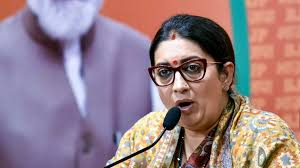Smriti Irani interview: ‘My 10 years as minister so stamped on people’s minds, they can’t envision me as anyone else’

In a recent and heartfelt interview, BJP leader Smriti Irani opened up about her journey in Indian politics. After serving as a Union Minister for 10 years, she believes her identity has become so closely tied to that role that people struggle to see her in any other light.
From TV Fame to Political Influence
Smriti Irani’s path to politics was anything but ordinary. She rose to fame in the early 2000s as Tulsi Virani in the hit television show Kyunki Saas Bhi Kabhi Bahu Thi. That role made her a household name.
In 2003, she joined the Bharatiya Janata Party (BJP). At the time, many questioned her shift from acting to politics. But Irani quickly proved her critics wrong. Over the next two decades, she became a prominent figure in Indian governance.
She held key portfolios such as Human Resource Development, Textiles, Women and Child Development, and Minority Affairs. Her consistent presence in the Union Cabinet built a strong image that continues to define her in the public’s mind.
‘A Minister in Everyone’s Eyes’
Reflecting on her time in power, Irani said, “My 10 years as minister are so stamped on people’s minds, they can’t envision me as anyone else.”
While she appreciates the recognition, she also sees the downside. People often overlook the many other roles she plays — actor, daughter, wife, mother, and writer. “I’ve lived many lives,” she added, “but to many, I exist only as a minister.”
Notable Achievements in Office
During her time as HRD Minister, Irani led the launch of digital learning platforms like SWAYAM. She also focused on raising the quality of education in colleges and universities.
As Textiles Minister, she worked to revive India’s handloom sector. Her campaigns encouraged support for local artisans and weavers.
Later, as Minister for Women and Child Development, she emphasized child nutrition, women’s safety, and welfare schemes. Under her leadership, the ministry expanded programs like Beti Bachao Beti Padhao and Poshan Abhiyaan.
One of her defining moments came in 2019, when she defeated Rahul Gandhi in Amethi. That victory ended the Congress party’s long-standing control over the constituency and marked a turning point in her political career.
Stepping Away, but Still Engaged
Now that she is no longer in the Cabinet, Irani is taking time to reflect. She enjoys reconnecting with parts of herself that had been put on hold during her years in power.
“There’s joy in simple things — reading, spending time with family, and visiting communities without an official agenda,” she said.
While many expect her return to a Cabinet post, Irani remains noncommittal. “If the party calls, I will serve. If not, I’ll still find ways to contribute,” she explained.
Handling Criticism and Double Standards
Irani has faced intense scrutiny throughout her political journey. From debates in Parliament to media controversies, she has dealt with pressure head-on.
“Criticism doesn’t break me; it sharpens my focus,” she said. She believes public life should be rooted in purpose, not popularity.
She also spoke about the gender bias women face in leadership. “Assertive men are seen as strong. Assertive women are often labeled as aggressive or arrogant. It’s a double standard we still deal with,” she said.
Service Beyond Power
Irani believes public service isn’t limited to holding office. She wants to contribute in areas like education, literature, and social work.
“I hope people will eventually see me beyond politics. There’s more I want to do — more I can offer,” she shared.
Her belief in serving with honesty and energy remains unchanged. Whether in politics or elsewhere, she is determined to make an impact.
Closing Thoughts
Smriti Irani’s journey from television star to political leader is one of resilience and reinvention. Her decade as a minister left a mark on India’s policy landscape and public memory.
As she enters a new chapter, she is focused on growth, purpose, and staying connected to the people she serves. “Whatever I do next,” she said, “it will be with the same passion I brought to public life. That part of me will never change.”






